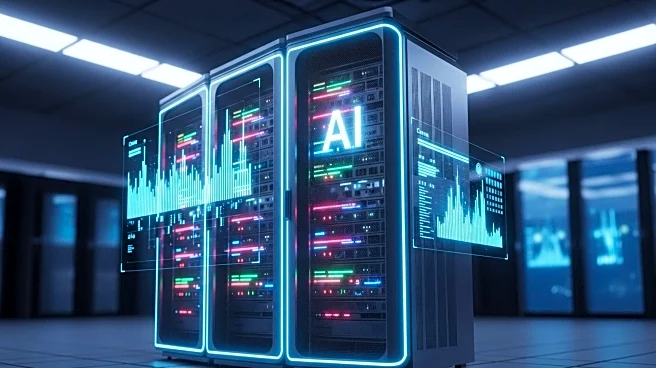What's Happening?
OpenAI Co-Founder and President Greg Brockman, along with Broadcom President Charlie Kawwas, appeared on CNBC's 'Squawk on the Street' to discuss their collaboration on AI infrastructure. The partnership involves co-developing custom AI chips optimized for specific workloads, enhancing computational power and efficiency. Brockman emphasized the need for increased compute power to support the AI revolution, while Kawwas highlighted the unique collaboration as a trifecta of custom AI accelerators, networking, and software. The discussion also touched on the rapid adoption of AI products like ChatGPT and Sora, which are driving unprecedented growth in the industry.
Why It's Important?
The conversation between Brockman and Kawwas highlights the transformative potential of AI technology in reshaping industries and economies. By developing custom chips, OpenAI and Broadcom aim to reduce costs and improve performance, making AI more accessible and efficient. This collaboration is part of a larger effort to build the infrastructure necessary to support the growing demand for AI applications, which could lead to significant advancements in various sectors, including technology, healthcare, and finance. The partnership underscores the importance of strategic collaborations in driving innovation and meeting the challenges of the AI revolution.
What's Next?
The deployment of the custom AI chips is expected to begin in the second half of next year, marking a significant milestone in AI infrastructure development. As the partnership progresses, it will likely lead to further advancements in AI technology and increased adoption across industries. The discussion also suggests potential future collaborations with other tech companies, as the demand for AI infrastructure continues to grow. The focus on building a resilient supply chain and securing power capacity will be crucial in supporting the expansion of AI capabilities.
Beyond the Headlines
The collaboration between OpenAI and Broadcom raises important questions about the ethical and societal implications of AI technology. As AI becomes more integrated into daily operations, issues related to data privacy, security, and the impact of automation on employment will become increasingly relevant. The partnership also highlights the need for sustainable energy solutions to support the growing power demands of AI infrastructure, prompting discussions on environmental responsibility and innovation in energy production.











